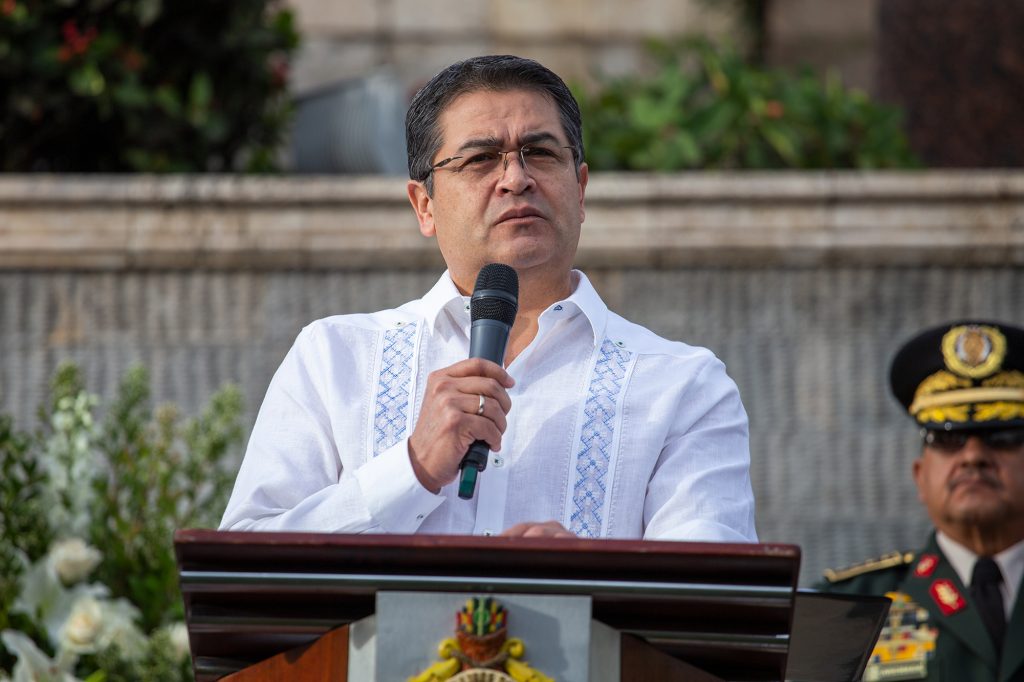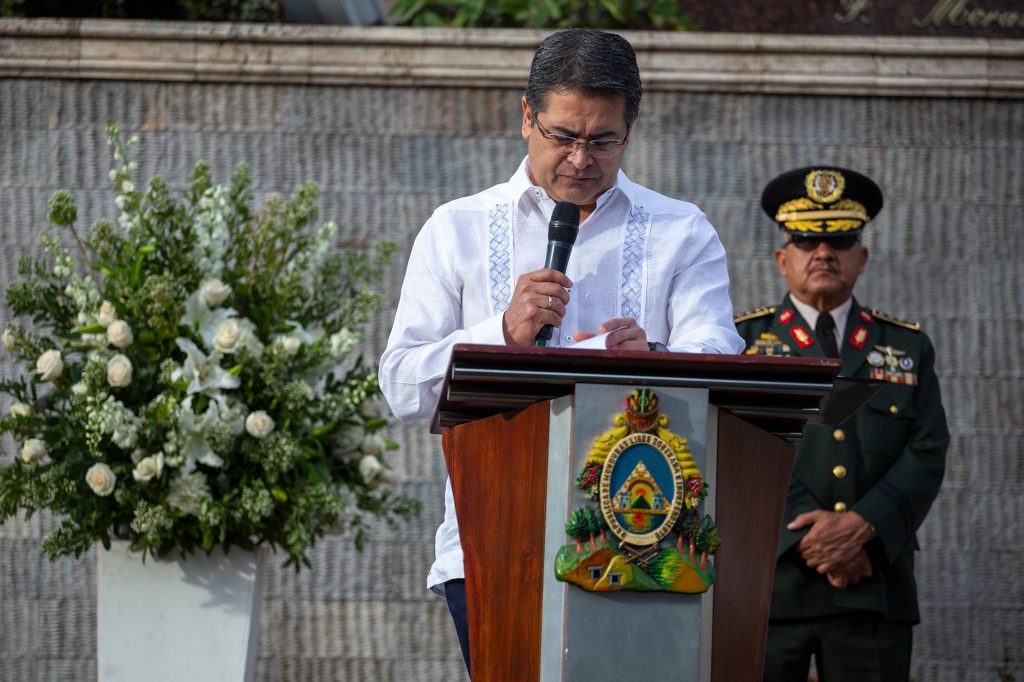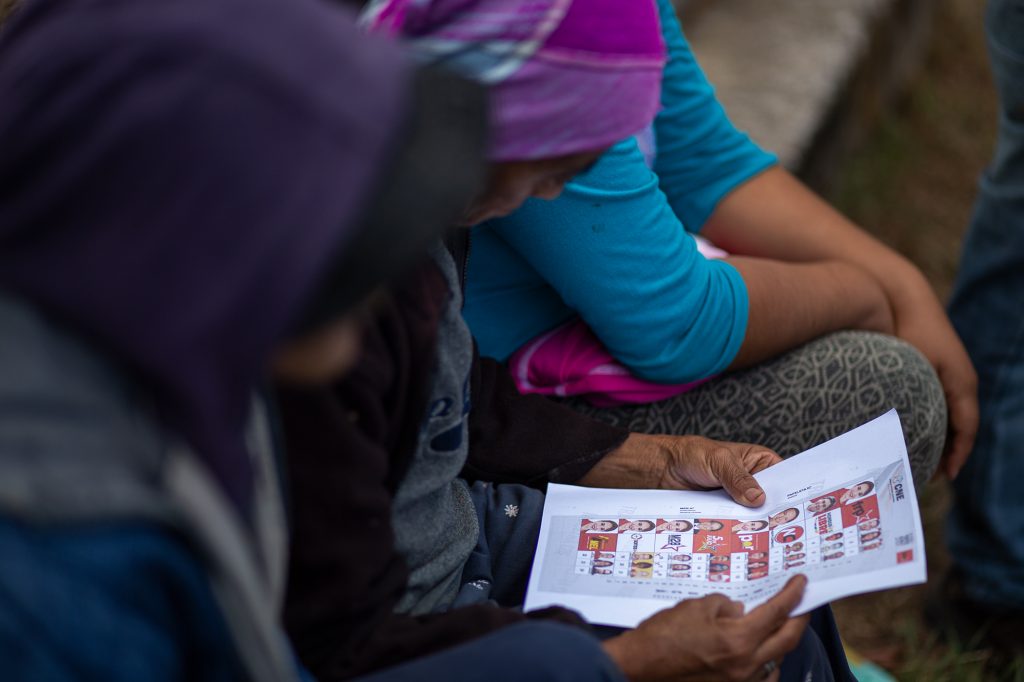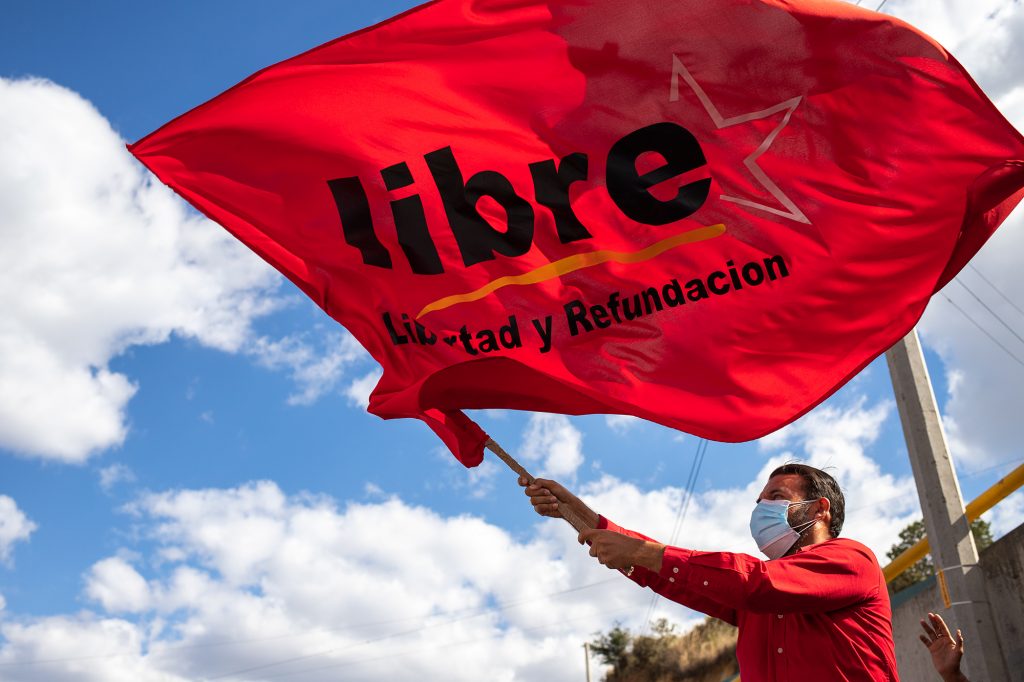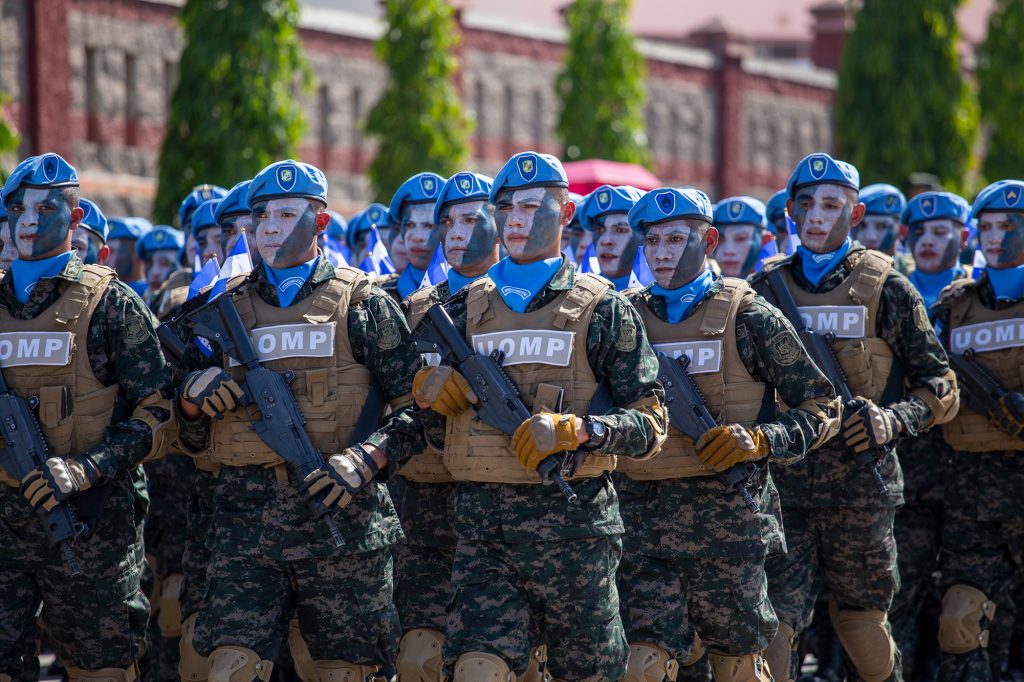The New York trial of Honduran drug trafficker Geovanny Fuentes has rattled Juan Orlando Hernandez and the country’s political elite. Devis Leonel Rivera, leader of the Cachiros cartel, testified in court that not only did he bribe the current president, he also bribed former President Jose Manuel Zelaya (2006-2009) and former presidential designate, Ricardo Alvarez, both of whom are running for Congress in the upcoming elections. U.S. prosecutors have also identified members of the Armed Forces, the National Police and a number of politicians who allegedly facilitated drug trafficking in Honduras. President Hernandez has reacted by warning that the allegations will severely undermine the fight against drug trafficking.
By Leonardo Aguilar
Photos by Martín Cálix
The trial of Geovanny Fuentes Ramírez, which began on March 8, is potentially more damaging to Honduran President Juan Orlando Hernández than his own brother’s conviction. Antonio “Tony” Hernández, a major drug trafficker convicted of four crimes in October 2019 is due to be sentenced on March 23, although his sentencing hearing has already been postponed several times. U.S. sentencing guidelines point to a sentence of life imprisonment due to the seriousness of the crimes for which he was convicted.
The prosecution’s case against Fuentes was released to the public on January 8, and reveals that when Juan Orlando Hernández was president of the National Congress and a first-term presidential hopeful, he pledged to protect drug trafficker Fuentes in exchange for money. He also allegedly ordered the Honduran Armed Forces to provide protection for drug traffickers, and met with businessperson Fuad Jarufe to ask him to finance his 2013 presidential campaign with laundered money.
According to a New York Times report, one of Fuentes’ defense attorneys, Eylan Schulman, stated that his client and Juan Orlando Hernández were introduced to each other by Fuente’s mentor, Fuad Jarufe, who was also his contact with the vice president and several army officials.
In his opening statement at the federal trial, prosecutor Jacob Gutwillig alleged that the Honduran president and leader of the National Party facilitated the transit of tons of cocaine through the country en route to the U.S., and ordered government, Armed Forces and National Police officials to assist drug traffickers.
The Fuentes defense team is intent on discrediting the prosecution witnesses, including Leonel Rivera, a former leader of the Los Cachiros cartel convicted of drug trafficking, alleging that he is a mass murderer who has killed 78 people. Rivera testified on March 11 that he lied in his initial testimony, fearing that Honduran authorities would retaliate against his family. The federal prosecutors have called Honduras a narco-state and have accused the current Honduran president of taking bribes from drug traffickers to fund his 2013 presidential campaign, and again in 2014.
On March 2, 2021, prosecutors asked Judge Kevin Castel to admit photographs showing the Honduran president meeting with drug traffickers into evidence. On March 9, some photos and data obtained from cell phones belonging to Fuentes and his son were presented at the trial, and the jury was able to view these photographs as well as contact information for police and military officials, including General René Orlando Ponce Fonseca.
Prosecutors displayed photos showing President Hernández with Fuentes’ young children, as well as another photo of Hernández with Fuentes’ brother. Independent journalist Jeff Ernst, who is covering the trial in New York, reports that the prosecutors claim this photo was taken at the president’s birthday party in 2017.
Tony Hernández, the president’s brother, is described in this trial by prosecutors as the link between Fuentes and President Hernández. The prosecutors also allege that the president urged Fuentes to work with his brother Tony to take full advantage of Fuentes’ cocaine lab. Fuentes was finally arrested in March 2020 in Miami and charged with several drug trafficking crimes.
See related articles:
Electoral reforms alone won’t stop illegal financing of political parties
The Criminal Age: A trial in New York reveals narco control in Honduras
The odd and large-scale corruption by Hilda Hernández, sister of the Honduran president
The trial has the potential to completely destroy the Honduran president’s cozy relationship with the U.S. government, although this relationship has become strained since President Biden took office. On March 9, the U.S. government warned that it cannot have close ties with leaders who fail to combat corruption. About Hernandez, State Department spokesperson Ned Price said, “Any leader … not prepared to combat corruption won’t be in a position to enjoy a close partnership with the United States.”
Before Biden took office, the president-elect outlined a plan to improve security and promote prosperity in partnership with the people of Central America, recognizing that the region’s Northern Triangle faced enormous challenges from violence, transnational criminal organizations, poverty, and corrupt and ineffective public institutions.
Meanwhile, Hernandez has taken to Twitter to defend himself. “Why should anyone believe false statements that I made deals with drug traffickers, when it’s a fact that Los Cachiros sought a deal with the U.S. government because criminals can’t make deals with me. They’re going to die in a foreign prison if their ‘Get Out of Jail Card’ doesn’t work for them,” said Hernandez on his official Twitter account.
Dana Frank, a professor of history at the University of California, Santa Cruz, wrote in a Washington Post article, “President Biden has a huge challenge on his hands in Honduras. Poverty, gang violence, corrupt security forces and a gutted state led by a repressive dictator, President Juan Orlando Hernández, are going to continue to generate waves of people trying to migrate north to safety.”
U.S. senators have also called for sanctions against Hernández due to abundant evidence of his involvement in corruption and drug trafficking. Representative Norma Torres posted a harsh Tweet directed at Hernandez, “Keep your cocaine & lies about fighting the corruption you wallow in for someone dumb enough to believe them.”
Where does Juan Orlando Hernández go from here?
“A wild animal becomes even more dangerous when it’s cornered and has nothing to lose. Everyone linked to the Tony Hernandez case is dying, one by one. That shows you how dangerous the political landscape is today,” said attorney Josué Murillo, a security and drug trafficking analyst, in an interview with Contracorriente.
Murillo is referring to the murders of people linked to the cases being prosecuted in New York. Melvin Edgardo Bonilla, Tony Hernández’s lawyer in Honduras, was shot to death on March 4 in Tegucigalpa. On February 26, six people were killed in a massacre, including businessperson and politician Miguel Carrion. In 2013, Carrio was identified by U.S. officials as the leader of a criminal gang. Also killed in the same massacre was ex-police officer Normando Lopez, who had been identified as one of Tony Hernandez’s collaborators during the trial of the president’s brother.
In October 2019, drug trafficker Magdaleno Meza, an associate of Tony Hernandez, was stabbed and shot to death inside a maximum security prison in Honduras. Days later, the director of that prison was also killed.
In light of this, Murillo says that it’s not unreasonable to think that President Hernández is looking to hold onto power “because before 2009, everyone said that a coup was impossible in Honduras. And then it happened. People said that a second term for the president was impossible because the constitution prohibited it. And then it happened.”
Murillo describes a few scenarios in which the president holds onto power by orchestrating a self-coup, convening a national constituent assembly, and even forcing the National Party to nominate him as its candidate for president. “He could also position himself as a presidential designate [an appointment whose sole purpose is to replace the president in his absence, death, or inability to hold office]. Can you imagine how terrible this would be? All of this is possible for those who want to protect the person in power,” he said.
The public identification of politicians in these trials puts many people other than Hernández in vulnerable positions, so impunity is something that will have to be negotiated by the political parties involved.
Raúl Pineda, an attorney and former National Party congressional representative used to be an ally of Juan Orlando Hernández when they both served in Congress. He believes that Hernández has no other option but to face justice in the United States. In an interview with Contracorriente, he said, “The future of the president of Honduras is in the hands of the U.S. justice system and that’s an indisputable fact.”
Faced with this reality, Pineda believes Hernandez will do what any cornered human being would do. “March forward. He can easily position himself as the National Party’s candidate for president by forcing one of the current candidates to withdraw. He can win elections with all the money he has. So, he has a range of options. People think that removing President Hernandez is going to be easy. But that’s not true. He’s a man with his life and dignity at risk. There’s a phrase that he likes to use, ‘l will do what I have to do,’” says Pineda.
Pineda also believes that Hernández will try to clear his name by saying that attacks against him are attacks against all of the country’s institutions. “He’s trying to deflect the accusations against him towards the National Police and the Army. No doubt some officers are involved, but the U.S. government has not targeted any institution as such. Hernandez’s fate is a matter of time”, said Pineda.
Sociologist Víctor Meza, an expert on security issues, doesn’t see any scenario other than Hernández relinquishing power. “I think it’ll be almost impossible for Juan Orlando Hernández to stay in power,” he says.
Honduras began a new electoral process on March 14 when internal and primary elections were held. However, only the three largest of the 14 registered political parties qualified to participate in these primary elections, which will select their official nominees for the November general elections. The other 11 political parties will have candidates running in the general elections.
The trial in New York is causing a tsunami within Honduras’ three major parties, as several of their candidates have been linked to drug traffickers.
Former President José Manuel Zelaya (2006-2009), is the general coordinator of the Liberty and Refoundation Party (Partido Libertad y Refundación or just Libre) which has nominated Zelaya’s wife Xiomara Castro for president. Zelaya is another prominent politician whose name has surfaced in the Fuentes trial, as has the name of Yani Rosenthal, a Liberal Party presidential hopeful, who recently returned to Honduras after serving a prison term in the U.S. for money laundering and collaborating with the Los Cachiros cartel in a criminal operation.
Certainly, the most serious accusations are against President Hernandez, the undisputed leader of the National Party, who is said to control Tegucigalpa mayor Nasry Asfura and the president of the National Congress, Mauricio Oliva; both of whom are vying in the primaries for the ruling party’s presidential nomination.
Pineda believes Honduras is a long way from having narco-free candidates for public office. “The country is still in the grips of the narcos; it’s a long-term situation. Candidates from the Libre Party, National Party and Liberal Party are all involved with the narcos. But that doesn’t mean that they’re not sweating it out right now.” He adds that the president will lose a lot of power after the primary elections. “In a few days, maybe weeks, the president will have to make a decision. Forty percent of the president’s influence will disappear. Some actors that currently support the president will be more inclined to support other candidates, and that will produce a change.”
The former leader of the Los Cachiros cartel, Devis Leonel Rivera Maradiaga, confirmed that he bribed politicians. He testified that $250,000 was paid to Juan Orlando Hernandez through Hilda Hernandez (the president’s deceased sister) in 2012. Rivera also claimed that he gave $500,000 to former President Jose Manuel Zelaya in 2006, as well as $500,000 to Ricardo Alvarez during his 2012 campaign.
Former President Zelaya didn’t wait long to respond. “The irrefutable proof that I never received a bribe is that I never appointed a minister under pressure from organized crime or the American embassy,” Zelaya posted on Twitter. Zelaya later ventured out to speak to the news media from his car. Taking off his face mask, he challenged Juan Orlando Hernandez to travel with him to the United States to clear up these accusations. “Let’s see who comes back home,” he said.
Prosecutors have called Honduras a narco-state during this trial; an accusation backed up by allegations against former Vice President Ricardo Álvarez, current presidential advisor Marvin Ponce, Army General René Orlando Ponce Fonseca, as well as other high-ranking or former government officials and members of the National Police and army. The Pro Honduras Network digital media outlet published a list of all the people, institutions and companies that are of interest in the Fuentes case.
Pineda Alvarado says that the U.S. has documentation indicating that Honduras’ last four presidents have received money from organized crime.
“There are accusations that [Juan Orlando Hernandez] received drug money. Some former presidents of Colombia and Mexico were also accused of this and didn’t suffer any legal consequences. But what’s different in this trial are the claims that President Hernandez actively participated in transporting tons of drugs,” said Pineda.
He added that politicians receiving drug money is not new, because “electoral campaigns are very long and expensive. These campaigns shouldn’t last longer than two months, but they go on for more than a year. That forces politicians to raise a lot of money if they want to get elected … The president of Honduras is in trouble, especially now that it appears that U.S. rhetoric is now focused on Honduras instead of Venezuela. Sanctions and an onslaught of negative media coverage are already having a major impact on the president and those around him.”
Pineda noted that people should be worried about being named as a person of interest in these cases, because “when [drug traffickers] are arrested and extradited, they tend to think, ‘Why me and not that other guy?’ That’s how Honduran narcos become informants.”
Former President Porfirio Lobo Sosa, a member of the National Party, was first named in the trial that convicted his son, Fabio Lobo, of drug trafficking. He recently tweeted, “Dr. Mauricio Oliva [president of the National Congress] – go ahead and support the approval of Congressperson Jorge Lobo’s proposed decree that all those named in the New York [trial] should be investigated. You should also demand that JOH [Juan Orlando Hernández] resign so he doesn’t use the presidency as a shield. What’s everyone afraid of? When you haven’t done anything wrong, you don’t need to be afraid!”
Time proves Alfredo Landaverde was right
Geovanny Fuentes’ capture in March 2020 brought out information that the National Police was involved in drug trafficking, but little has been said about the military’s role. According to the U.S. Drug Enforcement Agency (DEA), Geovanny Fuentes built a cocaine lab in the department of Cortes while Honduras was in turmoil after the 2009 coup. Fuentes also began bribing members of the National Police that year to provide security for his drug business.
The National Police enabled the production and trafficking of cocaine while at the same time violently repressing public protests against the coup. But a report released to the public on January 8 revealed the Armed Forces’ role. “[Geovanny Fuentes] associated with high-ranking politicians and military officials to facilitate his drug trafficking activities in a country that has been devastated by drug-related violence,” stated the report.
The Fuentes trial has again raised the allegations that when Juan Orlando Hernandez was president of the National Congress, he solicited money from Fuad Jarufe for his 2013 presidential campaign. The federal prosecutors also claim that Hernandez and the National Party were partly responsible for fomenting public corruption, and allege that he embezzled U.S. aid to non-governmental organizations in Honduras and stole money from the country’s social security system.
Alfredo Landaverde was the courageous coordinator of Honduras’ Anti-Drug Trafficking Directorate (Dirección de Lucha Contra el Narcotráfico – DLCN). He was murdered on December 7, 2011 in Tegucigalpa for denouncing drug trafficking in Honduras. His widow, sociologist Hilda Caldera, says, “When you see Juan Orlando Hernández avoiding accountability, you know he’s afraid of something. Something’s not right.”
Caldera says that besides the testimonies being heard in the Fuentes trial, the evidence presented is also very interesting. “The cell phone evidence, videos, documents and photos. When you haven’t done anything wrong, there’s no need to be afraid. He [Juan Orlando Hernandez] needs to prove that he’s not involved. It would be good if he publicly released his tax information. He’ll have to do something extraordinary for people to believe in him.”
“All the trial-related documentation is public information, available to any U.S. citizen who wants to see it. I asked prosecutor [Geoffrey] Berman for access to documents about who killed Alfredo. Many of those involved have already pleaded guilty in the United States. I only have access to individual statements, but I also want to see the evidence,” said Caldera. Geoffrey Berman is the former U.S. attorney for the Southern District of New York who prosecuted Tony Hernández and who was fired in June 2020 by former president Donald Trump for overseeing investigations into Trump associates.
The federal prosecutors in the Fuentes trial allege that Fuad Jarufe laundered drug money and then delivered bribes to finance Juan Orlando Hernández’s campaign. Just a few years ago, talking openly about business people linked to drug trafficking could get a person killed. Devis Rivera himself testified in the current trial that the protective cover and impunity provided by the Honduran government enabled him to be more violent, with free rein to kill. That atmosphere of impunity still surrounds cases like the Landaverde murder.
Shortly before his assassination in 2011, Alfredo Landaverde had publicly accused 14 Honduran business leaders of laundering drug money with the complicity of the government. Landaverde publicly stated that the country’s attorney general, chief of police, and Armed Forces all knew about this money laundering.
“I prefer to quote Alfredo in saying that many people, including whatever Liberal Party or National Party politicians are in power, are totally complicit in trafficking drugs in this country. This [corruption] is pervasive in political power structures as well as the justice system. They [drug traffickers] could never do this on their own,” said Hilda Caldera.
Caldera says that drug trafficking in Honduras is a system in which “they protect themselves and change laws. They launder assets and money through their banks. There are many people involved. But those currently in power are the most vulnerable.” She says the National Party is much more susceptible to corruption because they are the ones in power right now, but the same would be true for the Liberal Party if the roles were reversed.
Caldera claims that her husband was killed for revealing how drug trafficking corrupts “… the political and judicial systems, including the armed forces, because they’re the ones with the capability to pursue drug trafficking by land, sea and air. The police don’t have this same air and sea enforcement capability. This is what Alfredo was saying and that’s why they took his life.”
Hilda Caldera thinks that one of the best ways to neutralize drug trafficking is to have independent journalists with the courage to speak the truth. “We have to know the truth. There are so many media outlets of all kinds, and we know that the government pays some of them to keep quiet.”
Honduran sociologist Victor Meza, who was once part of a special commission to implement reforms to the national security apparatus in Honduras, agrees with Caldera and says, “The structure of a narco-state implies that individual institutions have been co-opted [by drug traffickers], especially institutions with judicial and security functions.”
mismos se protegen, se cambian las leyes, lavan los activos y el dinero en los bancos. Hay mucha gente involucrada. Pero los que están más vulnerables son los que están en el poder». Agrega que en estos momentos el Partido Nacional está mucho más vulnerable de ser corrompido porque son los que tienen el poder, pero que lo mismo estaría pasando si estuvieran los liberales.
Caldera revela que su esposo fue asesinado por explicar cómo el narcotráfico corrompió «el poder político y el sistema judicial, incluyendo a las fuerzas armadas, porque son los que tienen el poder para perseguir la droga por tierra, mar y aire. Porque la policía no llega al aire y no llega al mar. Todas estas cosas las decía Alfredo y por eso le quitaron la vida».
Hilda piensa que una de las cosas más importantes para neutralizar el narcotráfico es conocer la verdad a través de los espacios de comunicación independientes y valientes: «Tenemos que saber la verdad. Hay demasiados medios de comunicación de todo tipo, aunque hay medios que el Gobierno paga y no dicen nada».
El sociólogo hondureño Víctor Meza, quien formó parte, en su momento, de una comisión especial para hacer reformas de seguridad estatal, coincide con Caldera y dice que «la estructura de un narcoestado supone la cooptación a nivel individual de las instituciones, sobre todo en el área de operadores de justicia y seguridad».
“This means that the institutions charged with protecting us and with guaranteeing justice are being gradually contaminated by organized crime and cease to function as intended. As a society, we’re losing control of our own government,” said Meza.
The sociologist questions whether the primary and general elections this year can be effective. “How much legitimacy will the winning candidates have? I don’t know. That will depend on the quality of the electoral process and the legitimacy of the results, as well as the electorate’s level of satisfaction once all the votes are counted. I’m pessimistic. I’m pretty sure the internal elections will produce even more confusion, tension and division.”
Hondurans are crossing their fingers that the elections (the recent primaries on March 14 and general elections in November) will be transparent. However, this game has no clear rules and the current trial in the Southern District Court of New York has pushed uncertainty in Honduras to a peak.

